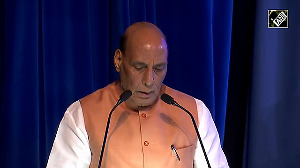Turnover tax is the high point of all pre-Budget talks in the stock market circles these days. While this concept has been debated several times in the past, successive finance ministers have refrained from effecting turnover tax.
Before, we go through this debate once again, here is what turnover tax actually means: it is a levy on every trade done in the stock markets. A small percentage, normally around 0.1-0.3 per cent of the total purchase/sale consideration is charged as turnover tax. So every time you trade you pay a small portion as tax.
This is usually in lieu of capital gains tax. The merits are obvious: ease of collection because tax gets deducted at the brokers end; lesser speculative trades as there is a certain disincentive for trading frequently. The market expects a turnover tax of 10-20 basis points on transactions.
In the forthcoming Budget, the government is likely to abolish short-term capital gains tax and impose turnover tax instead. In all probability, this will be applicable for investors across the board.
If turnover tax is not levied, then the distinction between long-term and short-term capital gains may be done away with and all capital gains taxed at the same rate of 15 per cent.
But some sources say there is a possibility of turnover tax being levied across the board i.e. including domestic investors. In such a situation, capital gains tax for stock trades may be scrapped altogether.
Currently, all purchases which are squared-off within a year attract short-term capital gains tax which is chargeable at the personal income tax rate. Profits arising from stocks, which are rounded off after one year attract long-term capital gains tax at the rate of 10 per cent.
This is also applicable for domestic investors. Also, capital losses, if any, can be set off against capital gains to reduce the overall tax liability.
For foreign institutional investors, short-term capital gains tax rate is 20 per cent but is charged at 10 per cent under the Mauritius double taxation avoidance treaty. Long-term capital gains tax is exempt. Thus, if turnover tax is levied, FIIs will not have to pay any capital gains tax at all.
Most countries across the world like Taiwan, Indonesia have effected turnover tax instead of capital gains tax and this has helped in reducing volatility in stocks. However, numbers tell a different story.
Evidently, a turnover tax mechanism is not enough to deter volatility, but it could form a significant deterrent for speculative traders.
"The levy of turnover tax will see speculative trades come at a higher cost," says Nimish Shah, director and CEO of Parag Parikh Financial Advisory Services.
According to him, the move may not curb speculative trades as much since traders are anyway paying 30 per cent as STCG tax. What it will actually do is streamline tax procedures which means less headache for investors and brokers alike.
A rather simplistic model where the broker will automatically deduct a turnover tax each time a transaction is made, the move will immensely benefit the exchequer.
While short-term capital gain taxes hardly get translated into considerable revenues (STCG accounts for hardly 2-3 per cent of the total revenues generated by the government) primarily because of rampant tax evasion, turnover tax will ensure a much larger sum in the hands of the government as tax will be deducted at source (at the broker's end).
"Revenue collection is easier and the move is beneficial in the long-term," says Andrew Holland, chief administrative officer and executive vice-president, research with DSP Merrill Lynch.
Detailed presentations submitted to the ministry by some major FIIs and brokers attests that the change towards turnover tax will not impact revenues for the government. A levy of 0.1 per cent on daily purchase and sales transactions on the National Stock Exchange would have translated into Rs 1250 crore (Rs 12.5 billion) of tax revenues in the past one year.
FIIs claim that they are compelled to take the Mauritius route due to the short-term capital gains tax levy. They favour turnover tax as they will not have to pay any capital gains tax at all, and it will relieve them of the gruelling of paper work.
Like they say, there are always two sides to a coin. If FIIs are happy, brokers are shivering at the mere thought of having to handle tax collections and the related paper work, leave alone increased scrutiny by tax authorities.
There is yet another worry. While turnover tax can make things much better for FIIs, extending this to domestic investors could mean loss of liquidity. Market participants say that the real fear is it could severely depress intra-day trading which accounts for nearly 60-70 per cent of total turnover on the bourses.
Last one year, non-delivery based transactions accounted for 67.43 per cent of total turnover on the National Stock Exchange. Day traders, who are the primary source of liquidity in the markets, will be discouraged as high transaction costs may make trades unviable.
Brokers argue that devoid of day-trading, markets will be rendered shallow. Also, lower liquidity in the cash markets will have their repercussions on the derivatives segment too.
Another concern is that the set-off facility currently available for capital losses will no longer be available if capital gains tax is replaced with a turnover tax.
"With the levy of turnover tax, not only does the investor have to suffer a loss but also pay a price for that" says a broker. Also, in the fickle world of equities where income is not a certainty, the move will make tax a certainty.






 © 2025
© 2025